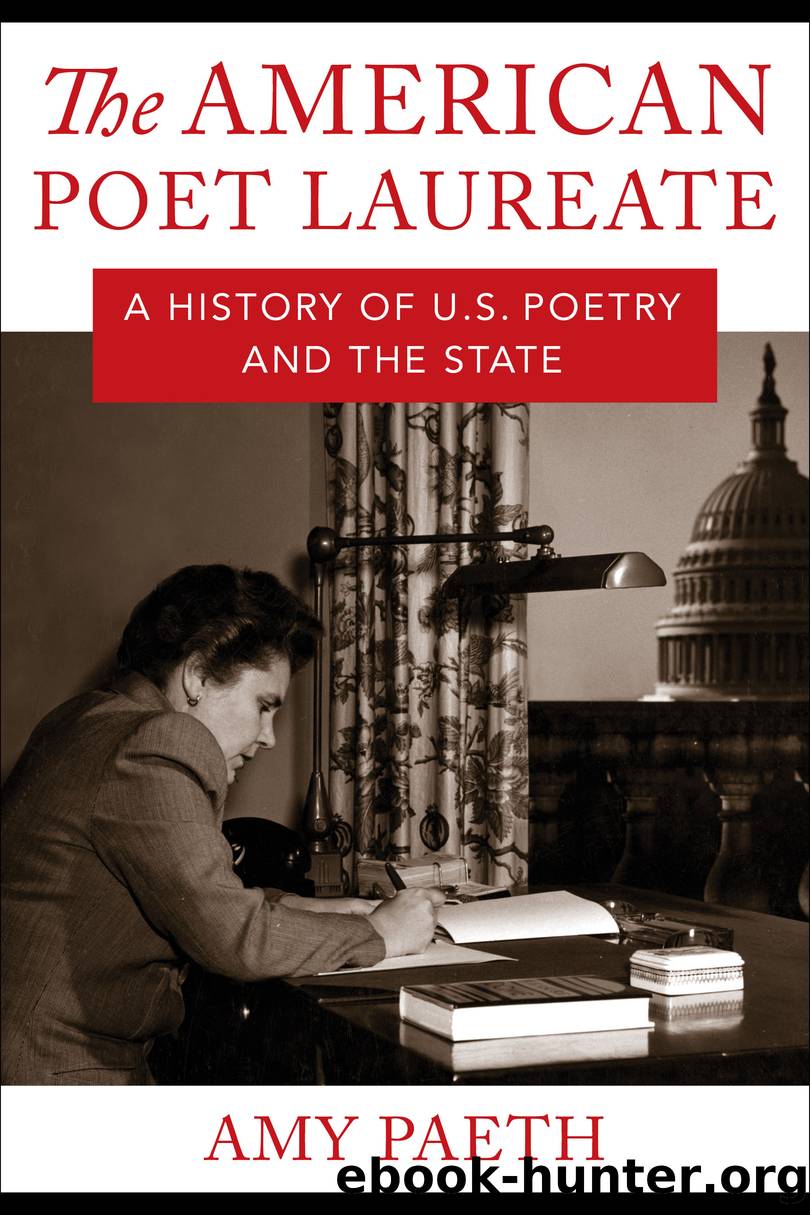The American Poet Laureate by Amy Paeth

Author:Amy Paeth
Language: eng
Format: epub
Publisher: Columbia University Press
State Verse Culture After the Cold War: National Poetry Projects in Context
* * *
National poetry projects are significant expressions of a broader shift in the civic function of poetry in postâCold War America. As Brodskyâs âpoetry for the massesâ rhetoric indexes, the early 1990s heralded a second wave of the Frost-Kennedy era national arts vision. The 1990s saw the reintroduction of government poetry prizes, inaugural poetry, and new forms of institutional cooperation between the state and literary organizations.
In 1990, the Library of Congress awarded the inaugural Rebekah Johnson Bobbitt National Prize for Poetry to James Merrill. Merrill, who had previously won the Bollingen Prize, was honored for The Inner Room (1988).14 It was the first prize the library had awarded since the spectacular fiasco of Poundâs Bollingen Prize in 1949, after which Congress ruled that a democratic government should not award prizes in âmatters of taste.â As we have seen, during the Cold War of the 1950s and 1960s the government played arbiter in matters of literary taste often more covertlyâthrough CIA fronts and by building its relationship with private interests. Congress reversed the Bollingen Prizeâinspired ruling in 1988, when the Bobbitt family endowed a $10,000 biennial prize to be given every other year in memory of President Lyndon B. Johnsonâs sister, Rebekah Bobbitt. The Bobbitt Prize was in fact conceived of as âthe new Bollingen Prize,â according to Robert Casper, who heads the Poetry and Literature Center, which runs the office of the poet laureate at the Library of Congress.15 Casper recalls that it was the intention of Philip Bobbitt, the son of Rebekah Bobbitt, to establish a prize that mirrored the Bollingen in structure. âThe Bobbitt family wishes to endow a national poetry prize ⦠in memory of Rebekah Johnson Bobbitt with the Bollingen Award as the model which the Bobbitt Prize might resemble,â Librarian of Congress James Billington noted in a memorandum recounting an initiating conversation with Bobbitt.16 Interestingly, Bobbitt would echo the language of the Library of Congress as it directed the fellows âto be deflected by political considerationsâ when administering the infamous first Bollingen Prize.17 In a letter to Nancy Galbraith, then-acting director for the Poetry and Literature Program, Bobbitt wrote that âthere ought to be a prize given by the nation and politics should play no part in it.â18 But the ânew Bollingen,â unlike its predecessor, would reflect the interests of a more robust, and mutually imbricated, set of state and state-private interests. âCongress through the distinguished chairman of the Oversight Committee, the White House, the American Academy of Poets, and several distinguished former poetry consultants have all concluded that the Library ought to re-enter the field and that the Rebekah Johnson Bobbitt prize I have discussed is the appropriate way to do this,â Bobbitt wrote.19 Unlike the singular committee of the fellows that awarded Pound the first Bollingen Prize, the Bobbitt Prize mission reflects a nationalized convictionââthe point is for the Library of Congress, home of the U.S. Poet Laureate, to also have
Download
This site does not store any files on its server. We only index and link to content provided by other sites. Please contact the content providers to delete copyright contents if any and email us, we'll remove relevant links or contents immediately.
4 3 2 1: A Novel by Paul Auster(12393)
The handmaid's tale by Margaret Atwood(7764)
Giovanni's Room by James Baldwin(7346)
Asking the Right Questions: A Guide to Critical Thinking by M. Neil Browne & Stuart M. Keeley(5775)
Big Magic: Creative Living Beyond Fear by Elizabeth Gilbert(5772)
Ego Is the Enemy by Ryan Holiday(5450)
The Body: A Guide for Occupants by Bill Bryson(5097)
On Writing A Memoir of the Craft by Stephen King(4944)
Ken Follett - World without end by Ken Follett(4732)
Adulting by Kelly Williams Brown(4574)
Bluets by Maggie Nelson(4556)
Eat That Frog! by Brian Tracy(4540)
Guilty Pleasures by Laurell K Hamilton(4449)
The Poetry of Pablo Neruda by Pablo Neruda(4109)
Alive: The Story of the Andes Survivors by Piers Paul Read(4033)
White Noise - A Novel by Don DeLillo(4010)
Fingerprints of the Gods by Graham Hancock(4004)
The Book of Joy by Dalai Lama(3986)
The Bookshop by Penelope Fitzgerald(3853)
